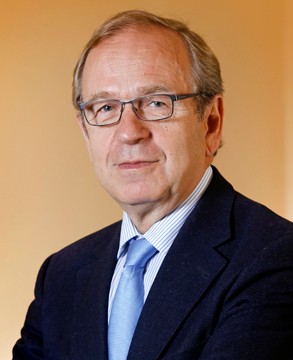In October 2018, Erkki Liikanen took over from Michel Prada as Chair of the IFRS Foundation Trustees. His profile page can be found here.
In this interview, Mr Liikanen shares his thoughts about his new role, the work of the IFRS Foundation and his interests outside of work.
Why were you interested in becoming Chair of the Trustees?
I was approached just as I was about to step down as Governor of the Finnish Central Bank—a role that I had held for the last 14 years, and so I was ready for a fresh challenge.
I have followed IFRS Standards since the beginning. I was a European Commissioner when, in 2002, the European Union decided to adopt IFRS Standards from 2005 onwards. And during the financial crisis, I was a Central Bank governor when the G20 endorsed the work to achieve high-quality, globally accepted accounting standards. These events demonstrated to me the importance of IFRS Standards to the global economy.
Also, when I studied the organisation, I found many people who I knew well and respected had also held this role—particularly Paul Volcker, Tommaso Padoa-Schioppa, Gerrit Zalm and most recently Michel Prada. All this made the role very interesting.
What role do you believe financial reporting plays in the global economy?
When investments go cross-border, the only way to make this work properly is if the standards are the same and practices are the same. That doesn’t just mean that private investors benefit—public pension funds also benefit from globally consistent high-quality standards that provide full disclosure. They increase liquidity, which in turn can generate higher returns.
There are also other aspects that are becoming increasingly important, such as reporting on sustainability, climate change and corporate and social responsibility. These are all very significant developments, but the core financial reporting is still critical. And the financial reporting must be done in a way that can be relied on everywhere, and that’s what IFRS Standards help to do.
What do you see as the IFRS Foundation’s biggest challenges?
I have used the last few weeks to study the great and admirable history of the IFRS Foundation. Of course, the world has come a long way in the adoption of IFRS Standards. As we get closer to full global adoption, it is important to ensure that our Standards are properly implemented, in the same way, in all jurisdictions. This doesn’t change the core purpose of the organisation, but it does change the focus of our work in the longer term.
What are you looking forward to most in the new role?
I’ve been working with many multilateral institutions: the European Commission, the International Monetary Fund and several other bodies. But somehow, this is a genuinely global body. You feel it when you come into the room, when I meet my fellow Trustees and when I speak with the Board and staff. In this world, we can play our part to demonstrate the benefits of globalisation, by ensuring the Standards are the same. It is always intellectually interesting to see how this type of institution works.
We must all work to guarantee the independence of the International Accounting Standards Board, through the work of the Trustees and also that of the IFRS Monitoring Board. This is important in protecting the character of the organisation.
What will your priorities be as Chair?
Once my appointment was confirmed, I set about researching the organisation—so I’ve done my homework! When it comes to any new role as Chair, your first task is to look at what your core functions are, according to the Constitution. One of the most important things is to look at your strategy. So, we must ask the right questions: what is essential, what is most relevant, how can we be most efficient and to respond to feedback from stakeholders? We’re not in a hurry, but we need to do our work properly. This will be my first priority. I will benefit from the great work done by my predecessor, Michel Prada.
How will your previous experience help you in your role?
I’ve been working in an international context throughout my career, right back to when I was an exchange student studying in New York. I give my input from that experience. And from a central banking and prudential regulation perspective, I was deeply involved in the international response to the financial crisis.
Part of the attraction of the role is to learn something new. I am not an accountant, but I have studied many financial reports having spent nine years as Chairman of the Audit Committee of the European Central Bank. And as Minister of Finance, I was the counterpart of our auditing system.
What did you want to be when you were six years old?
A priest! My parents were very religious, and I came from a large family of six children. During the summer, we lived on the second floor above some religious meeting rooms. In that hierarchy, the priest was by far number one! However, I soon became interested in public affairs and at the age of 21 I became the youngest-ever member of Parliament in my home country of Finland.
Finally, what do you do in your spare time?
I have many hobbies, but two main ones. The first is music. I played flute when I was young, and I have an enduring love of jazz. I also love classical music, with Shostakovich and Mahler being among my favourites. And I also love literature. I am moderating a writers’ tour in November—it is one thing to read, but another to talk to the author who has written the book.
I go jogging to keep fit, and I also do some 5k and 10k races, but not too fast. My claim to sporting fame is having completed a marathon in 3 hours and 40 minutes—but that was 25 years ago!

